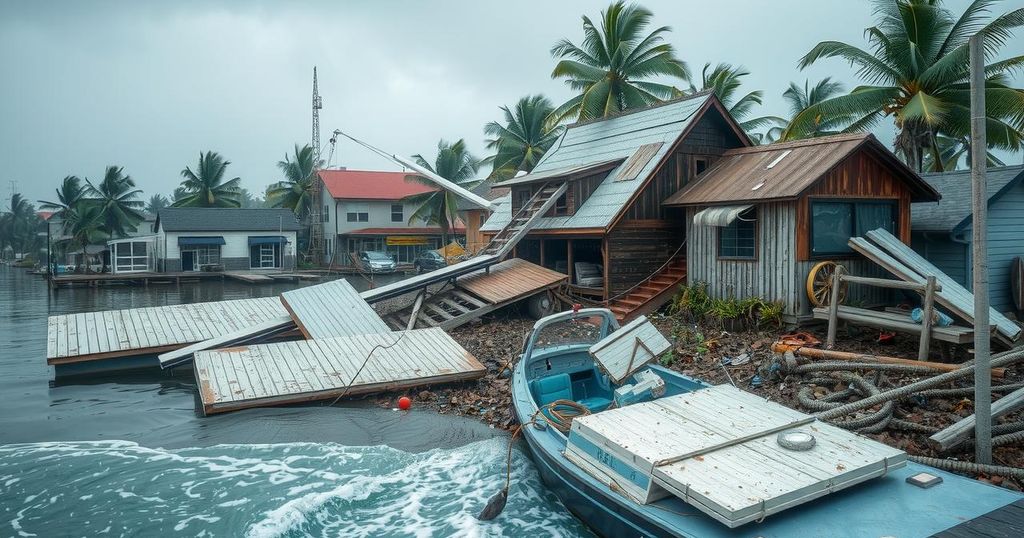Tropical Cyclone Chido: Catastrophe Strikes Mayotte Amid Climate Change Concerns
The article discusses the devastating impact of Tropical Cyclone Chido on Mayotte, where thousands may be dead. It also examines the implications of transitioning U.S. environmental policies under the incoming Trump administration, alongside the recent failed UN COP16 summit. Additionally, it addresses alarming findings regarding coastal subsidence in Miami and the severe typhoon season in the Philippines, all linked to climate change.
Tropical Cyclone Chido has wrought devastation upon the island region of Mayotte, resulting in a significantly rising death toll, which could reach into the thousands. This Category 4 hurricane struck Saturday, bearing winds of up to 136 miles per hour and producing catastrophic destruction. Authorities have documented scenes of obliteration across neighborhoods and critical infrastructure, with a local hotel owner stating, “It is as if an atomic bomb fell.” As the search for survivors continues, the majority of the worst damage has impacted areas housing vulnerable undocumented migrants.
Concurrent to this disaster, significant environmental policy shifts are underway in the United States as President Biden’s administration races against time to finalize pivotal decisions before the end of his term. Reports indicate that essential loans aimed at promoting clean technology face uncertainty amidst speculation of a shift in priorities under the incoming Trump administration, including potential cuts to electric vehicle support and stricter measures regarding imports from China.
Additionally, the recent UN COP16 summit aimed at addressing global desertification ultimately failed to produce an actionable agreement, reflecting ongoing tensions in climate negotiations. The consequences of not securing commitments from wealthier nations to support those facing droughts in poorer countries remain a pressing concern.
An urgent report highlights alarming findings regarding Miami’s beachfront condos, which are subsiding at unexpected rates, signaling the potential long-term impacts of climate change and rising sea levels. The urgent need for monitoring these coastal structures has been underscored by researchers to better understand the implications of such changes.
The article concludes with an overview of significant weather events linked to climate change, notably an exceptionally intense typhoon season in the Philippines, which saw a worrying increase in storm frequency and intensity, leading to casualties and substantial economic impacts, illustrating the growing urgency of climate action to mitigate these disasters.
Tropical Cyclone Chido’s impact on Mayotte presents a harrowing example of the destructive potential of extreme weather, intensified by changing climate patterns. The storm’s severity underscores the vulnerability of small island territories, particularly those with high populations of undocumented migrants who may lack the resources to recover from such disasters. On the political front, the article highlights the precarious state of U.S. environmental policy amidst a transition of administration, further complicated by international climate negotiations that have yet to yield effective agreements. The shrinking window of opportunity for decisive climate action frames the context for these intertwined stories of disaster and policy.
In summary, Tropical Cyclone Chido has caused unprecedented destruction in Mayotte, with the death toll expected to rise amidst critical infrastructural loss. Concurrently, political shifts in the U.S. could jeopardize key environmental advances, while failed international negotiations on desertification stress the global need for collective action. The ongoing impacts of climate change manifest in various ways, from local disasters to shifting governmental priorities, highlighting the urgent necessity for sustained environmental commitments and adaptation measures.
Original Source: heatmap.news




Post Comment